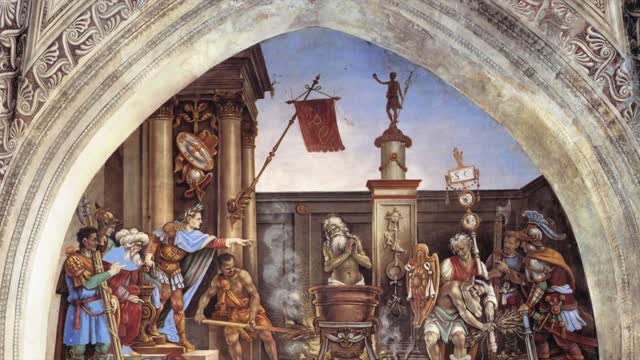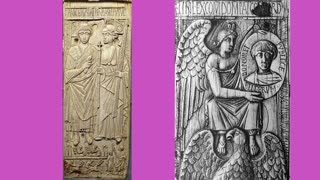Premium Only Content

S. IOANNES APOSTOLVS ANTE PORTAM LATINAM IN FLAMMIS ILLÆSVS
S. IOANNES APOSTOLVS ANTE PORTAM LATINAM IN FLAMMIS ILLÆSVS (95. A.D.)
http://zazzle.com/ProVaticanus
Torture of St John the Evangelist
1487-1502
Fresco
Strozzi Chapel, Santa Maria Novella, Florence
The Torture of St John the Evangelist is in the lunette above the scene of St John the Evangelist Resuscitating Drusiana on the left wall of the chapel.
The torture of John the Evangelist takes place in a splendidly decorated courtyard. On orders from Emperor Domitian he was placed in a cauldron of boiling oil near the Porta Latina, but emerged unharmed. One of the soldiers is poking the fire so strenuously that another, in the group on the right, about to throw more wood on it, has to protect his face with his hand, and a third screens himself with his shield. At this moment the emperor has risen from his seat and extended his arm, bringing a stop to the torture.
Maii 6.
S. JOANNIS APOSTOLI
ANTE PORTAM LATINAM.
AD PRIMAS ET SECUNDAS VESPERAS.
Urbem Romuleam quis furor incitat?
Christi discipulus Caesare judice
Damnatus rapitur: nil venerabilis
Frontis canities movet.
In fervens olei conjicitur mare:
Nil aestus nocuit, flamma sed hospiti
Parcit blanda suo; ceu pugil ungitur,
Hinc et fortior exilit.
[120]
Edicto steriles pulsus in insulas
Exul tunc socio perfruitur Deo:
Hic ventura videt, quae calamo notans
Sublustri nebula tegit.
Sic nos Christus amet, sic doceat pati;
Discamusque mori, simus ut et necis
Sacrae participes: non aliis patet
Coelum conditionibus.
Patri maxima laus, maxima Filio,
Amborumque sacro maxima Flamini:
Haec est certa fides, fontibus e tuis
Quam divinitus hausimus.
AD LAUDES.
Jussu tyranni pro fide
Pulsus, Joannes, exulas:
Fertur volatu libero
Mens celsa supra sidera.
Illic revelat se tibi
Qui mortuus vivit Deus,
Agnus salutis hostia,
Et morte devicta leo.
Arcana te vatem docet
Regni sui mysteria:
Pandit cruore Martyrum
Ubique spargendam fidem.
[121]
Da, Christe, nos tecum mori;
Tecum simul da surgere;
Terrena da contemnere;
Amare da coelestia.
Sit laus Patri; laus Filio,
Qui nos, triumphata nece,
Ad astra secum dux vocat:
Compar tibi laus, Spiritus.
In the year 95, Saint John the Evangelist, the only surviving Apostle, who was governing all the churches of Asia Minor (present-day Turkey), was apprehended at Ephesus and sent in chains to Rome. The Emperor Domitian did not relent at the sight of the venerable old man, but condemned him to be cast into a cauldron of boiling oil. The martyr doubtless heard, with great joy, this barbarous sentence; the most cruel torments seemed to him light and agreeable because he hoped they would unite him forever to his divine Master and Saviour. But God accepted his will and crowned his desire; He conferred on him the honor and merit of martyrdom while suspending the operation of the fire, just as He had formerly preserved the three children from injury in the Babylonian furnace. The seething oil was changed for him into an invigorating bath, and the Saint came out more refreshed than when he had entered the cauldron.
The glorious triumph of Saint John happened just beyond the gate of Rome called the Latina. A church which ever since has borne this title was consecrated there, in memory of the miracle. Domitian saw this miracle without deriving the least advantage from it, remaining hardened in his iniquity. Nonetheless, he contented himself afterwards with banishing the holy Apostle to the little island of Patmos. Saint John returned to Ephesus during the mild reign of Nerva (96-98), who during his short imperial government lasting one year and four months, merely labored to restore the faded luster of the Roman Empire.
Reflection. Saint John suffered above the other Saints a martyrdom of love, being a martyr and more than a martyr, at the foot of the cross of his divine Master. All Our Lord's sufferings were by love and compassion imprinted in his soul, and thus shared by him. O singular happiness, to have stood under the cross of Christ! O extraordinary privilege, to have suffered martyrdom beside Jesus, and been eye-witness of all He did or endured! If nature revolts within us against suffering, let us call to mind those words of the divine Master to Saint Peter: Now thou knowest not why, but thou shalt know hereafter. (John 13:7)
Little Pictorial Lives of the Saints, a compilation based on Butler's Lives of the Saints and other sources by John Gilmary Shea (Benziger Brothers: New York, 1894)
#StJohn #LatinGate #Phoenix
Ago tibi gratias Deo per instrumenta de "Epic Music VN" pro bono rei publicae.
-
 4:49
4:49
ProVaticanus
18 days agoDiptychon Consulare Basilii, Consulis Ordinarii Anno 541 #SPQR #COS #Roma #541AD #ProVaticanus
12 -
 12:39
12:39
Michael Button
4 hours ago $0.05 earnedAn Entire Civilization Might Be Buried Under the Sahara
3321 -
 4:38
4:38
Michael Heaver
10 hours agoShifting UK Triggers Rapid REVOLUTION
230 -
 58:53
58:53
The White House
2 hours agoPress Secretary Karoline Leavitt Briefs Members of the Media, July 31, 2025
11.1K14 -
 5:48:07
5:48:07
JuicyJohns
6 hours ago $2.81 earned🟢#1 REBIRTH PLAYER 10.2+ KD🟢$500 GIVEAWAY SATURDAY!
63.1K3 -
 LIVE
LIVE
IrishBreakdown
2 hours agoNotre Dame Fall Camp Practice Report
85 watching -
 1:04:08
1:04:08
Timcast
3 hours agoPelosi MELTS DOWN After Trump Accuses Her Of INSIDER TADING, PELOSI ACT Moves Forward
133K76 -
 1:54:53
1:54:53
Steven Crowder
5 hours ago🔴 Is the Sig Sauer P320 Killing People & Trump Wins the Trade War: Guest Brandon Herrera
294K229 -
 1:09:57
1:09:57
Rebel News
2 hours agoCanada to recognize Palestine, US trade deadline looms, Charter-protected bike lanes | Rebel Roundup
19.1K9 -
 1:00:16
1:00:16
TheAlecLaceShow
2 hours agoGuest: Roger Stone | Kash Patel Finds Hoax Docs in Secret FBI Room | The Alec Lace Show
14.7K5